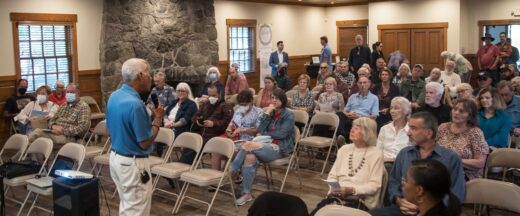At the Oct 18 meeting of the Riverside County Board of Supervisors, Ordinance 927.1 (Regulating Short Term Rentals [STRs]) and Ordinance 671.22 (Consolidated fees for land use) were again on the agenda as well as the report due pursuant to Ordinance 449.251 (the STR moratorium). And more will come at the Oct. 25 board meeting.
At its Oct. 4 meeting, the board requested more changes to the previously agreed-to revisions of 927. The latest changes involved how the size of the lot will affect the maximum permitted occupancy of an STR and the notification procedures of obtaining a STR certificate.
The board did approve a new Ordinance 927.1 at its Sept. 13 meeting, but the supervisors also asked for several more changes included in this version of the ordinance.

PHOTO BY PETER SZABADI
Occupancy
Permitted occupancy of an STR will be limited to one person per 200 square feet of the structure, depending on the size of the lot on which the structure is located.
For properties on one-half acre or less, the maximum occupancy will be 10 people. In the previous version, the lot size limitation for 10 occupants was a full acre. This was changed as a result of public comments at the Oct. 4 meeting.
For STRs on lots greater than one-half acre and less than 2 acres, maximum visitors may be 16. On properties larger than 2 acres, maximum occupants may be 20.
STRs whose occupancy limit exceeds 10 people must still comply with the preapproved list of upgrades.
The checklist now states that installing a fire sprinkler system is recommended but not required. Any further changes to the pre-approved list of upgrades will require the Executive Office’s review and approval before becoming effective.
Notifications
When an owner is granted a certificate for operating an STR, they are required to notify neighboring property owners of the certification within 10 days.
The revised 927 specifies that STRs on lots of less than 5 acres must contact owners of all properties located within a 300-foot radius of the recently approved STR. If the property is greater than 5 acres, the notification must go to all property owners within 600 feet of the STR parcel.
Fees
The draft of Ordinance 627.22 was approved on Oct. 4 and this was the second reading for approval.
The revised fee ordinance increases the initial cost of obtaining an STR certificate to $740 from $250 currently. A certificate renewal fee will be $540 up from the current $100 fee. And the new fee levels will increase 4% annually. This will offset the salary increases for Laborers’ International Union of North America members, which includes Code Enforcement department officers and Planning Department Land Use technicians, according to the county.
Moratorium
The 45-day moratorium on new STR certificates, approved at the Sept. 13 meeting, expires Oct. 28 unless extended. The moratorium applies to the Idyllwild area, including Pine Cove and Mountain Center, and the Temecula Valley Wine Country. The moratorium would not prohibit the operating STRs that have already obtained a county STR certificate.
However, Ordinance 449.251 also requires that the Planning Department prepare and submit a report to the board before any action on the moratorium, such as extending or letting it lapse, occurs.
Charissa Leach, director of the county’s Transportation and Land Management Agency, which includes the Planning Department, asked the board to accept the report and then hold a hearing at its Oct. 25 meeting to consider extending the moratorium until Sept. 9, 2023, another 10 months.
Since the moratorium was approved Sept. 13, county planning officials and Supervisor Chuck Washington have held two community meetings to discuss STRs —their effects on neighbors and neighboring homes, and their regulation. The first meeting was Oct. 3 in Idyllwild, where attendance was about 100 people. The next evening, on Oct. 4, Washington and county staff listened to comments from Wine Country from about 135 residents.
The county sought more information and opinions about several subjects, such as how to impose a cap on STRs and how large a cap on STRs should be; whether STRs should have a live-in host; limits on the number of days each year an STR may be rented; the distance between STRs;and several other issues.
Attendees were asked to rank the various issues and questions using stickers numbered 1 through 5. Upon entering, each attendee was given the stickers. Later, they were asked to place them next to the various issues, in essence, a ranked-choice system to identify the communities’ priorities.
In Idyllwild, the issue that received the greatest number of priority 1 stickers was placing a cap of 10% on the number of STRs in the area. Nearly one-third of the attendees identified this as their first priority.
Interestingly, the top priority of the attendees at the Wine Country meeting chose a ban on STRs in their area as the top priority. This represented one-fifth of the people there.
Based on the placement of the priority 2 stickers, the Idyllwild community sees a limit placed on the number of STRs on a certain zone, block, area or census tract as its second priority.
The third priority was asking the county to consider available housing when making further STR regulations. This received about 20% of the priority 3 stickers. It was followed by a limit on how many days an STR can be rented per year. And the fifth collective priority was to require an STR to go through a permit process with neighbors’ input to obtain a permit.
Several other concepts gained the county’s attention. These include requiring a 300-foot minimum distance between STRs, allowing only hosted STRs and having the county consider the Transient Occupancy Tax when making further regulations.
The entire report is in the agenda at http://riversidecountyca.iqm2.com/Citizens/Detail_Meeting.aspx?ID=2662.
The Planning Department had several reasons for initiating the moratorium request. A temporary moratorium of new STRs in Idyllwild, Pine Cove and
Mountain Center, as well as the Wine Country, was necessary to mitigate adverse impacts to surrounding neighbors and properties from STRs. These negative effects could come from unpermitted large-scale events, excessive noise, disorderly conduct, traffic congestion, illegal vehicle parking and accumulation of refuse. Both communities have unique features that require further study to ameliorate these adverse impacts.
The density of STRs in Idyllwild and the Wine Country also far surpasses that of any other area in the unincorporated area of the county. These concentrations of STRs can have an adverse impact on residential character, neighborhood stability, public safety and quality of life, demonstrating the need to consider different regulations to separate, eliminate or cap the number of STRs in certain areas, according to the county.
This report also will be on the board’s Oct. 25 agenda, when it will hold a public hearing on whether to extend the moratorium on issuing new STR certificates in the Idyllwild-Pine Cove areas and the Wine Country. The maximum extension is 10 months and 15 days.










